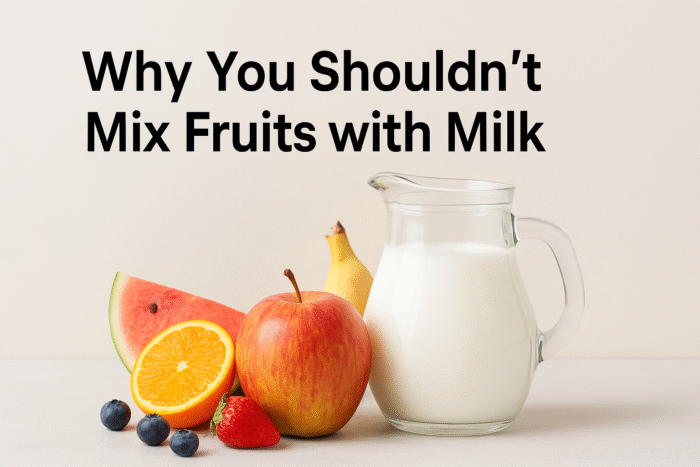Introduction: The Popular Yet Controversial Combo
Mixing fruits with milk is a common practice in many households, from breakfast smoothies to post-workout shakes. While it may seem like a healthy option, many health experts and ancient practices like Ayurveda suggest otherwise. In this blog, we explore why fruits should not be mixed with milk, the possible side effects, and healthier ways to enjoy both.
Scientific View: What Happens When Milk and Fruits Mix?
From a scientific standpoint, milk is a complete food rich in proteins and fats, whereas fruits are mostly simple carbohydrates. When combined, fruits with milk can cause digestive issues because fruits digest faster than milk. The stomach processes fruits quickly, but milk takes longer. This mismatch can lead to bloating, gas, and indigestion. Hence, it’s advisable to avoid mixing fruits with milk unless properly timed.
Ayurvedic Perspective: The Incompatibility of Milk and Fruits
According to Ayurveda, fruits and milk are not compatible. Milk is considered heavy and cooling, while many fruits — especially citrus and sour ones — are light and heating. Combining them is believed to disturb the body’s balance, leading to toxins, or “Ama,” accumulation in the body. This can further cause skin diseases, allergies, and gut disorders over time. Ayurvedic wisdom strongly discourages fruits and milk combinations.
Fruits You Should Never Mix with Milk
Not all fruits react the same way with milk. Here’s a list of fruits that should not be mixed with milk:
- Citrus fruits (oranges, lemons, grapefruits)
- Strawberries
- Pineapples
- Bananas (controversial but often discouraged)
- Cherries
- Melons (especially cantaloupes and watermelons)
These fruits are either acidic or have enzymes that curdle the milk, leading to digestion problems and sometimes even producing mild toxins.
Health Risks of Combining Fruits with Milk
Some of the major side effects of fruits with milk include:
- Bloating and gas
- Upset stomach
- Toxin buildup in the body
- Skin issues like rashes and breakouts
- Allergies and food intolerances
For those with a sensitive digestive system, it is crucial to understand why to avoid fruits with milk to prevent unnecessary health problems.
Exceptions: When is it Safe to Mix Milk and Fruits?
There are a few exceptions where mixing is safe:
- Sweet fruits like mangoes, avocados, dates, and figs are considered safe to blend with milk.
- Proper preparation, like soaking dry fruits before mixing, also helps digestion.
- Always use fresh, ripe, and sweet fruits when combining with milk to minimize harmful reactions.
Still, it’s best to consult with a nutritionist if you’re planning to incorporate fruit-milk combos regularly.
Healthy Alternatives: Best Ways to Consume Milk and Fruits Separately
If you love both fruits and milk, you don’t have to give them up — just consume them separately:
- Have fruits as a mid-morning snack and milk as an evening drink.
- Try almond or oat milk if you wish to make smoothies with fruits.
- Blend fruits with yogurt instead of milk for a more digestion-friendly option.
By doing this, you can avoid the milk and fruit digestion issues that many people unknowingly suffer from.
Conclusion: The Right Way to Enjoy Fruits and Milk
While fruits and milk are both highly nutritious on their own, combining them isn’t always the healthiest idea. Both modern science and Ayurveda recommend avoiding certain harmful food combinations to maintain gut health and overall wellbeing. Next time you reach for a fruit and a glass of milk, consider eating them at different times to truly reap their individual benefits!
FAQ
1. Can we mix fruits with milk?
While it’s common to mix fruits with milk, doing so can sometimes cause digestive problems. Certain fruits, especially sour and citrus varieties, can curdle milk in the stomach and lead to bloating, gas, or indigestion.
2. Which fruits should not be mixed with milk?
Fruits you should avoid mixing with milk include:
- Citrus fruits (oranges, lemons, grapefruits)
- Strawberries
- Pineapples
- Melons (watermelon, cantaloupe)
- Cherries
- Sour or unripe fruits
These fruits can react negatively with milk and disturb digestion.
3. Are there any fruits that can be safely mixed with milk?
Yes! Sweet and ripe fruits like mangoes, avocados, dates, and figs are considered safe to mix with milk. However, it’s best to use fresh and ripe fruits to minimize any adverse reactions.
4. What are the side effects of mixing fruits with milk?
Possible side effects include:
- Bloating and gas
- Upset stomach
- Toxin (Ama) buildup according to Ayurveda
- Allergies
- Skin issues such as rashes and acne
5. Why do Ayurveda experts advise against mixing fruits and milk?
According to Ayurveda, fruits and milk have incompatible qualities. Milk is heavy and cooling, while many fruits are light and heating. When combined, they disturb the body’s natural balance, causing toxin formation and digestive problems.
6. How long should I wait between eating fruits and drinking milk?
Ideally, you should wait at least 1.5 to 2 hours after eating fruits before consuming milk. This allows the fruits to digest first, preventing any digestive disturbance.


